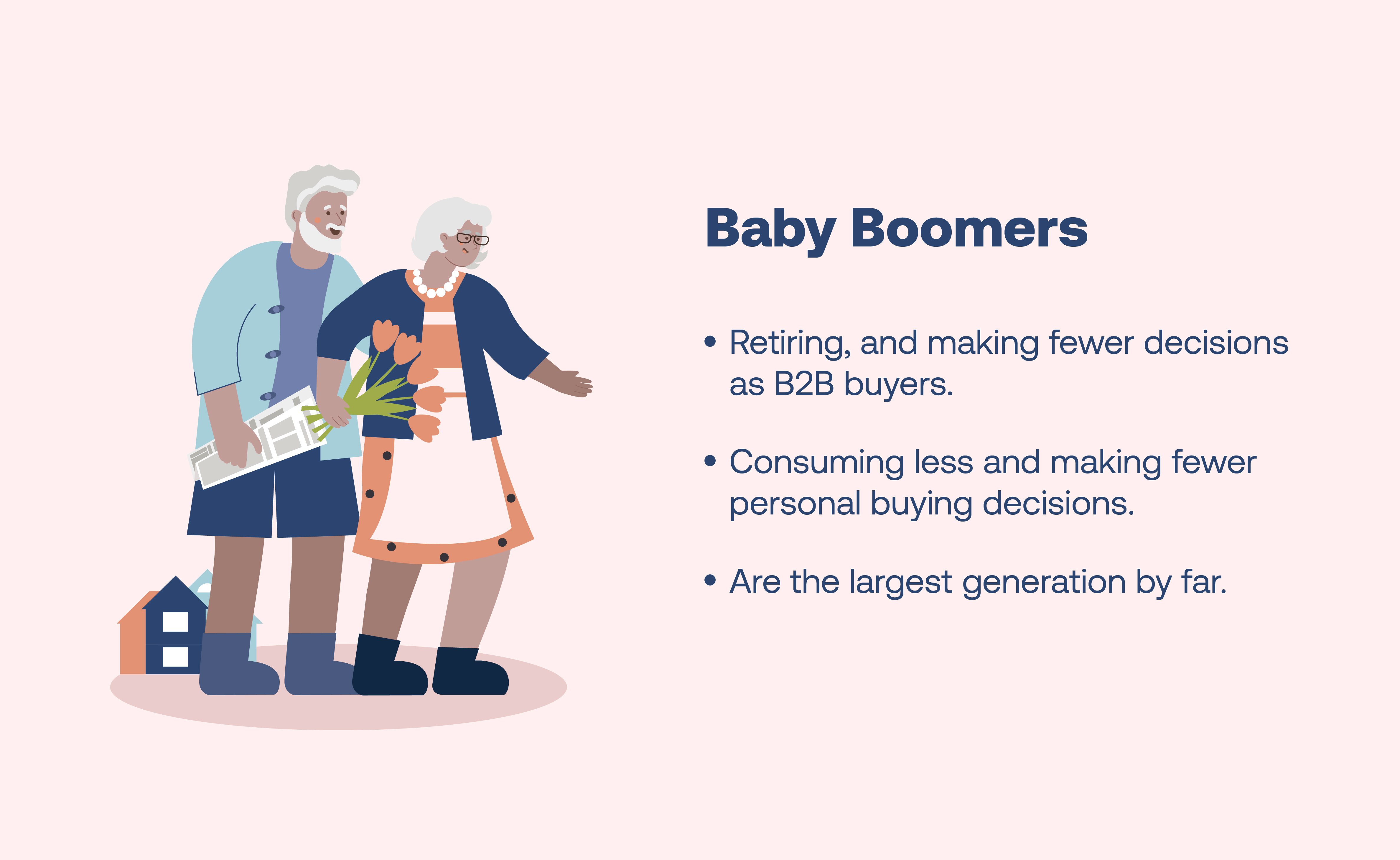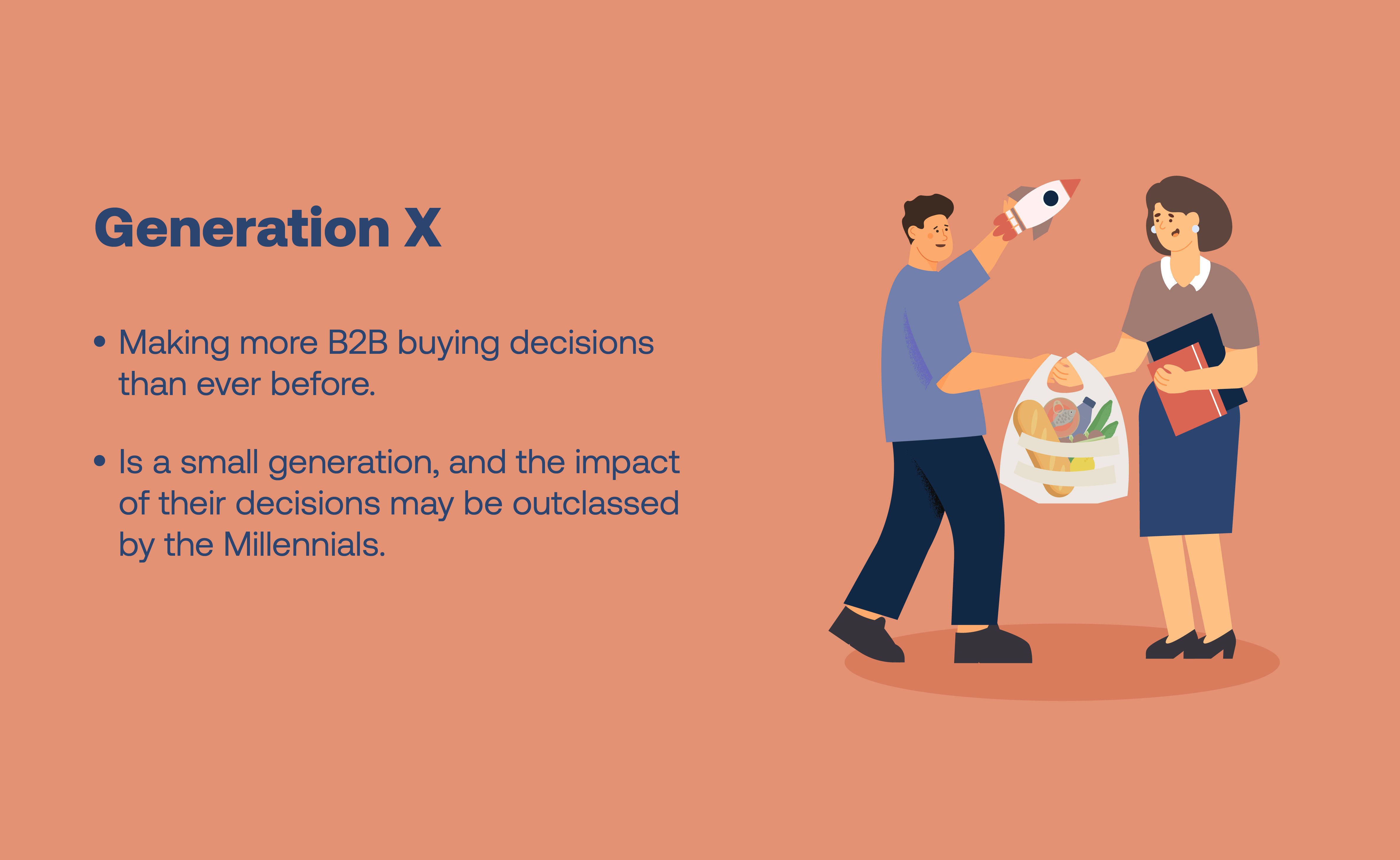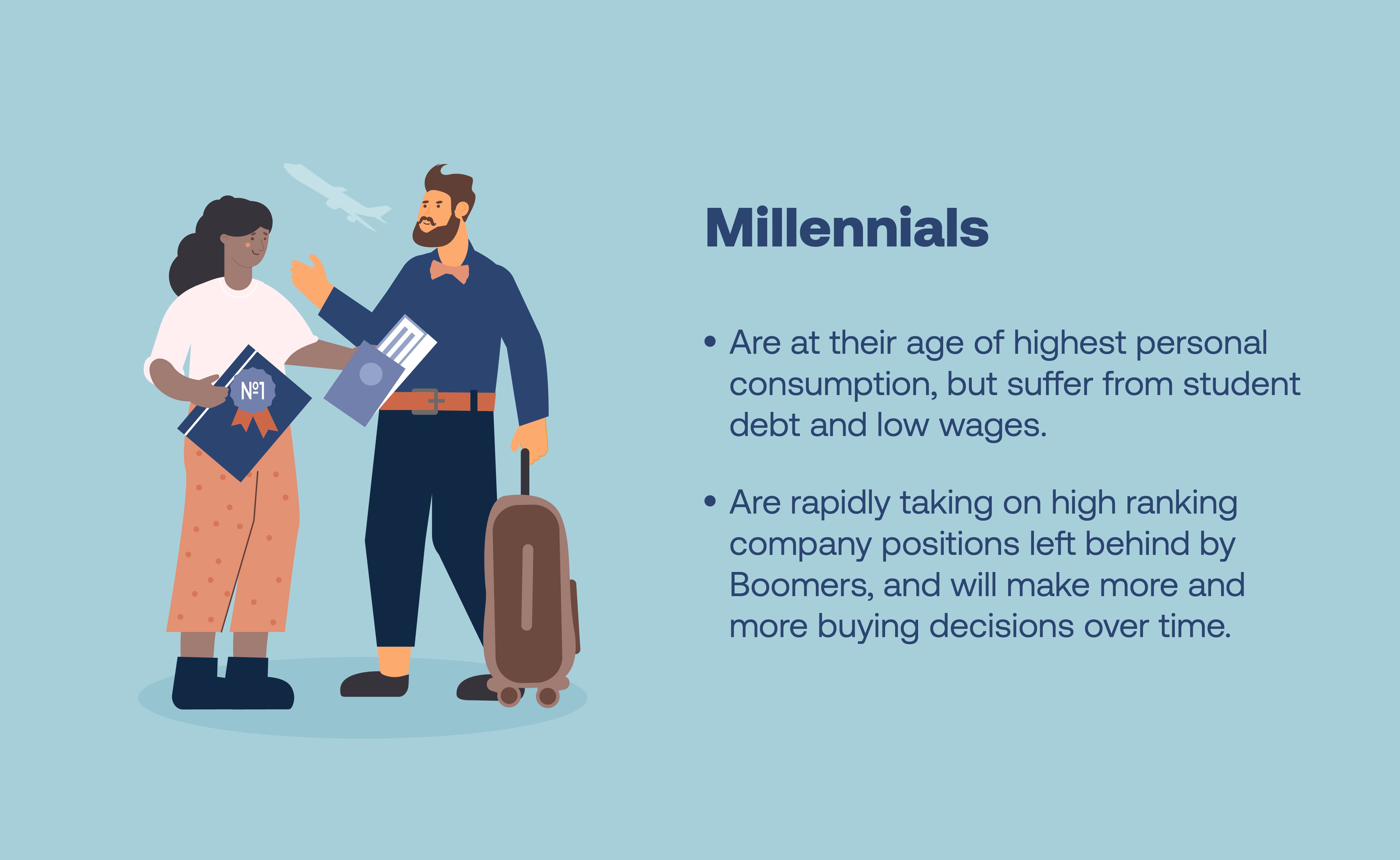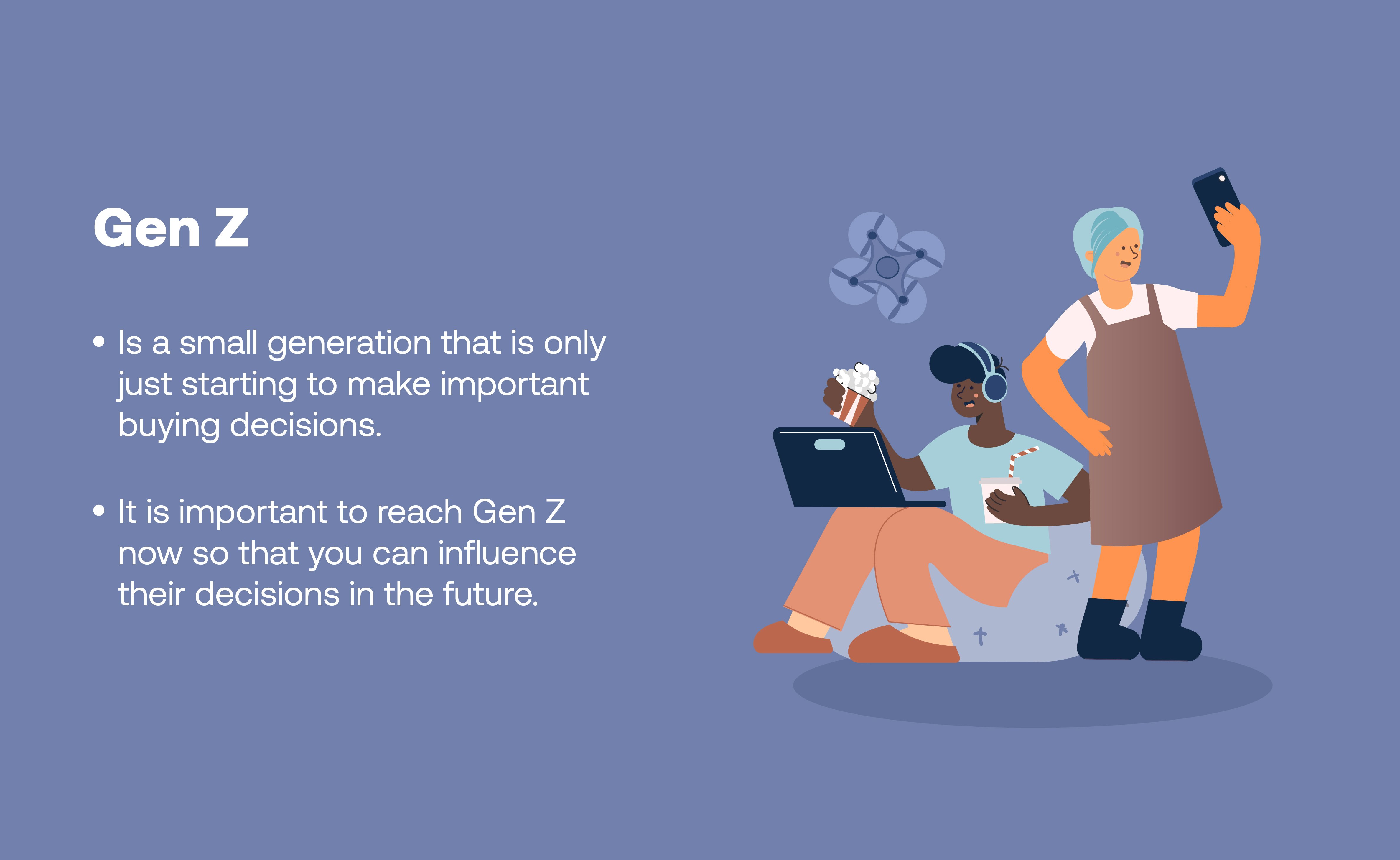Connecting With Future Buyers: Shifting Buyer Demographics (4/4)
Approx 4 min. read

In a recent article, Connecting with Future Buyers, we discussed three important shifts happening that affect the decisions of future buyers. One of the most important is demographic — Gen Z is now entering the workforce, and businesses should understand how they think. Demographic shifts are affecting consumer trends as well as B2B buying decisions.
This information is important for the long term. Marketing and branding are processes that yield their biggest fruits over the course of years and decades, not days or weeks. This is especially true in the B2B space, where a company may only need to upgrade computers or furniture every 5 to 10 years.
While Gen Z may not be making many important buying decisions right now, it is crucial to begin reaching them years in advance. In this article, we will take a closer look at how different generational dynamics are playing out across the board.
4 Generations of Buyers and How They Drive Buyer Behavior
Although so much media focus covers Gen Z these days, it is important to examine how every generation is changing. The early 2020s are a pivotal demographic moment in history
Baby Boomers
The Baby Boomers are retiring. Born between 1945 and 1963, most of them are now eligible for Social Security, and many have retired. The “Great Resignation” of the last few years was largely fueled by the inevitable retirement of this generation. And we’ve known this would happen in the 2020s since the last Boomers were born six decades ago.

This retirement means fewer buying opportunities across the board. For one thing, few Boomers in the workforce means fewer Boomers making buying decisions. And more retired Boomers means lower rates of consumer behavior and more investment in safer assets.
Key Takeaways:
-
Baby Boomers are retiring, and making fewer decisions as B2B buyers.
-
Baby Boomers are consuming less and making fewer personal buying decisions.
-
Baby Boomers are the largest generation by far, so this is a big deal.
Generation X
Gen X workers, now middle-aged, stand firmly at or near the height of their careers. This also means that their salaries are about as high as they ever will be. But Gen X has mostly finished raising kids and buying houses. Their consumption is relatively low, despite their higher earnings.
 Gen X used to be the “permanent intern” generation. But now that the Baby Boomers are leaving the workplace en masse, Gen X is filling in their shoes and finally reaching the coveted top positions in the management hierarchies. Expect to see more and more members of Gen X making big buying decisions.
Gen X used to be the “permanent intern” generation. But now that the Baby Boomers are leaving the workplace en masse, Gen X is filling in their shoes and finally reaching the coveted top positions in the management hierarchies. Expect to see more and more members of Gen X making big buying decisions.
Key Takeaways:
-
Gen X is making more B2B buying decisions than ever before.
-
Gen X is a small generation, and the impact of their decisions may be outclassed by the Millennials.
Millennials
Millennials are in their 20s and 30s. These are peak consumption years–raising kids, and buying cars and houses. Unfortunately, history has not been kind to them, and they often lack the funds to consume at the rate of their predecessors. Many take on credit card debt in addition to student loan debt to compensate.
 Because Gen X is so much smaller than the Baby Boomer generation, many of the new seats in the workforce will actually be held by millennials. This is simply a fact of numbers–there are far more Millennials than Gen X individuals. Expect to see plenty of Millennials making big buying decisions as well.
Because Gen X is so much smaller than the Baby Boomer generation, many of the new seats in the workforce will actually be held by millennials. This is simply a fact of numbers–there are far more Millennials than Gen X individuals. Expect to see plenty of Millennials making big buying decisions as well.
Key Takeaways:
-
Millennials are at their age of highest personal consumption but suffer from student debt and low wages.
-
Millennials are rapidly taking on high-ranking company positions left behind by Boomers and will make more and more buying decisions over time.
Generation Z
Gen Z just started working. Few are in important buying decisions at this time. Few have the financial resources to buy much for themselves right now.
 But time moves fast, and the number of Gen Z individuals in important buying decisions will only increase. Because buying decisions are made with years of conditioning in mind, it is important to stay top of mind with Gen Z now, in order to influence their decisions later. Marketing and branding are long-term processes that yield the most returns for younger consumers.
But time moves fast, and the number of Gen Z individuals in important buying decisions will only increase. Because buying decisions are made with years of conditioning in mind, it is important to stay top of mind with Gen Z now, in order to influence their decisions later. Marketing and branding are long-term processes that yield the most returns for younger consumers.
Key Takeaways:
-
Gen Z is a small generation that is only just starting to make important buying decisions.
-
It is important to reach Gen Z now so that you can influence their decisions in the future.
Other generations
While your 90-year-old grandmother may be adorable, she and her fellow Silent Generation friends are not likely to be making huge buying decisions in the near future.
But Generation Alpha, the youngest people alive today, will be an important force to consider for the future retail market. Companies with a very long-term focus should take note.
It’s not yet clear how big this demographic will be. They are mostly the Millennial’s children, and the Millennials are the largest demographic after the Boomers. But on the other hand, fewer and fewer Millennials are choosing to have kids, leading to a declining growth rate. If Gen Alpha turns out to be very big, their buying decisions will be extremely important in 20 years.
Generation Z as Future Buyers
Because Gen Z is the group replacing the Boomers, their buying decisions are starting to make an impact right now. At the moment, they occupy few company positions of power, so their decisions are mostly for personal consumption. But increasingly, they will have a voice in B2B buying decisions as well.
Several factors are worth considering here:
Generation Z is the smallest generation in US history. There are only about 68 million of them in total, roughly half of whom are working. And many will be competing directly with Millennials, the 2nd largest generation, for jobs. This suggests that they will share a similar fate to Gen X: forever out of reach of top positions, and possibly a bit cynical about working life. How this plays out in the long term may depend on the size of Gen Alpha.
Generation Z is highly mobile. They started to enter the workforce en masse during the rise of remote work during the pandemic. They’ve used the internet their entire lives. To Gen Z, physical location is often an irrelevant detail. Company loyalty follows suit.
Generation Z is analytical and well-researched. Key events of their upbringing include the rise of social media, the 2016 election, and the proliferation of misinformation online. Having grown up around so much noise, they are apt to be wary of all kinds of information. Prepare to support your sales processes with lots of well-researched facts.
Future Buying Across Demographics
Modern consumer behavior crosses generations. Good marketing covers every generation in the workforce. This means catering not just to Gen X and Millennial individuals currently running the show in most companies, but also to the Gen Z individuals who will be running the show soon.
It’s often said that Gen X is the ignored middle child, and this still remains true. Although many are making important buying decisions now, there are relatively few of them overall, and most will retire in the next two decades.
That’s why so much marketing these days is oriented toward Millennials and Gen Z. On the one hand, there are so many Millennials. And on the other hand, Gen Z will be in the workforce for another 40 years. To make the best of the current situation, take every generation into account, and consider how their buying habits will play out over the next few decades.
Related posts
Food for thought.

Connecting with Future Buyers (1/4)
by Patrick Gallant

Connecting With Future Buyers: Category Entry Points (3/4)
by Patrick Gallant